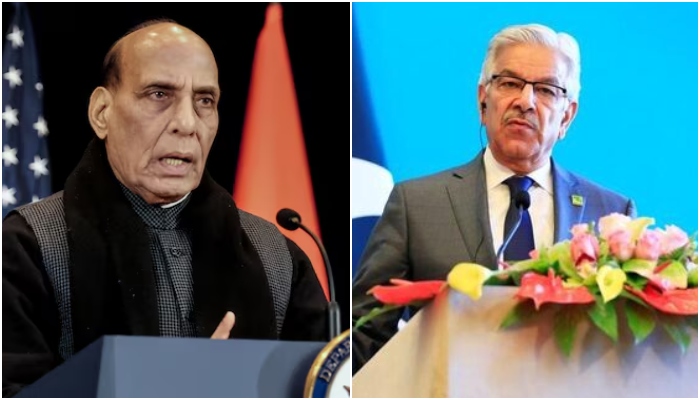
ISLAMABAD: The Foreign Office on Wednesday dismissed reports of a possible meeting between Defence Minister Khawaja Asif and his Indian counterpart Rajnath Singh, clarifying that no such engagement is scheduled during the Shanghai Cooperation Organisation (SCO) Defence Ministers’ Meeting.
In a statement, the Foreign Office confirmed that Asif will participate in the SCO meeting in Qingdao, China, which begins today.
On the other hand, Turkish media reports have suggested the possibility of the first face-to-face meeting between the defence ministers of two South Asian countries since the recent military standoff between Islamabad and New Delhi.
The Turkish media stated that Asif will lead the Pakistani delegation at the two-day SCO meeting. Whereas, the Indian defence minister will also attend the forum with a high-level delegation. It further reported that Singh is scheduled to hold meetings with the defence ministers of China, Russia, and other nations.
Meanwhile, government sources have said Asif has reached China to attend the SCO event. While, the Indian minister is also present there.
The SCO meeting is set to deliberate on regional and global security, counter-terrorism cooperation, and military ties.
Earlier, National Security Advisor (NSA) Lt Gen Asim Malik attended the 20th meeting of the secretaries of the Security Council of SCO Member States on Tuesday in Beijing, China.
In addition to interacting with Chinese leadership, during the visit, the NSA delivered an important speech reiterating Pakistan’s stance on the global, regional situation and contributions to peace and security, besides meetings with key leadership of SCO countries to enhance bilateral and security cooperation.
As part of his engagements, the NSA emphasised on Pakistan’s desire for a stable and peaceful neighbourhood and its role as a net regional stabiliser.
The military confrontation between Pakistan and India — which included cross-border strikes by both the nuclear-armed nations — came weeks after 26 tourists were killed in Indian Illegally Occupied Jammu and Kashmir’s (IIOJK) Pahalgam with India blaming Pakistan for the attack in April.
After the incident, India killed several innocent civilians in unprovoked attacks on Pakistan for three days before the Pakistan Armed Forces retaliated in defence with the successful Operation Bunyan-um-Marsoos.
Pakistan downed six IAF fighter jets, including three Rafale, and dozens of drones. After at least 87 hours, the war between the two nuclear-armed nations ended on May 10 with a ceasefire agreement brokered by the United States.
Since the US-brokered ceasefire that followed, both Islamabad and New Delhi have undertaken a diplomatic outreach initiative globally to present their respective stance on the recent clashes between the arch-rivals.







